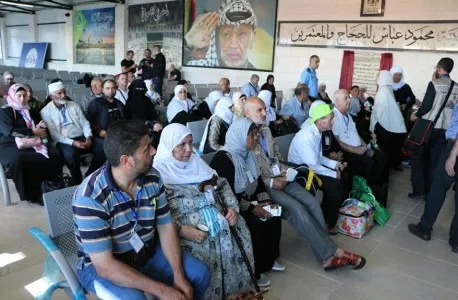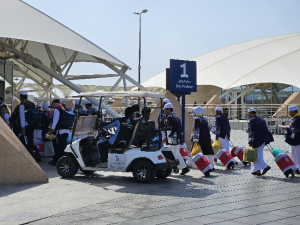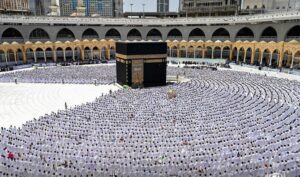Jakarta, MINA – The Directorate General of Hajj and Umrah Organization of the Ministry of Religion of the Republic of Indonesia continues to prepare services for pilgrims. The finalization process was accelerated, after the certainty of the number of quotas for Indonesian pilgrims.
Domestic services began with discussing the Cost of Organizing the Hajj (BPIH) with Commission VIII of the House of Representative until a Presidential Decree was issued, said Director General of PHU Hilman Latief in a press release from the Ministry of Religion received by MINA on Monday.
He said the time available for the finalization of the service setup was not much. This is because the government of Saudi Arabia only announced the certainty of quotas in mid-April 2022, or a week before holidays and Eid leave.
“In fact, the first batch of pilgrims will depart on June 4, 2022,” said Hilman.
Also Read: MUI Warns Government of Risks Behind Proposed Stabilization Force Deployment to Gaza
So, what services are provided for pilgrims? Hilman explained that pilgrims’ services are divided into two broad categories, namely domestic services, and services abroad (as long as the pilgrims are in Saudi Arabia).
Domestic Service
Domestically, pilgrims will receive a number of services, ranging from filing, to departure and return services at the Hajj hostel.
Furthermore, the Directorate General of PHU identified pilgrims entitled to leave in accordance with the quota number set by Saudi Arabia.
Also Read: Prof. El-Awaisi: The Mandate to Liberate Al-Aqsa Began at Prophethood
“The list of names of 92,825 regular pilgrims who are entitled to depart this year already exists. I have issued a decree and since yesterday it has been announced and distributed to the Regional Offices of the Ministry of Religion in all provinces in Indonesia,” Hilman explained in Jakarta.
“Furthermore, pilgrims who have been determined to have the right to leave, can immediately confirm their departure to the bank where the congregation registered,” he continued.
Director of Domestic Hajj Services Saiful Mujab added that his party is currently finalizing the cooperation contract process with airlines that will dispatch and repatriate Indonesian pilgrims. There are two airlines, namely Garuda Indonesia and Saudia Airlines.
“Intensive coordination processes with the Ministry of Transportation, the Ministry of Health, the Covid-19 Prevention Task Force, and the Regional Government are also continuing to be carried out in the process of preparing for this year’s Hajj,” he explained.
Also Read: Mount Semeru Erupts, Trapping Dozens, Forcing Evacuations in East Java
Regarding the preparation of Hajj hostel services, Saiful Mujab emphasized that his party had carried out the sterilization process for the dormitories that would be used for the locus of departure for pilgrims. Later, there will be a number of services prepared for pilgrims, including lodging facilities for 1 x 24 hours, final health checks, giving identity bracelets, giving passports, providing living costs (pocket money), and strengthening hajj rituals.
“At the Hajj hostel, before leaving, pilgrims will receive three meals and two snacks. When they return to their homeland, the congregation will get one snack or snack,” explained Mujab, his nickname.
Mujab added that the quota for Indonesian Hajj in 1443 H/202 was 100,051. This number consists of 92,825 regular hajj quotas and 7,226 special hajj quotas.
“Regular Hajj pilgrims are planned to be divided into 241 groups and are expected to depart on 236 flights, with Garuda Indonesia and Saudia Airlines,” he said.
Also Read: President Prabowo Inaugurates UAE-Funded Emirates–Indonesia Cardiology Hospital in Solo
Service in Saudi
There are three types of congregational services in Saudi Arabia, namely: accommodation, consumption, and transportation. Director of Foreign Hajj Services Subhan Cholid said accommodation services were prepared with reference to hotel quality standards, distance to the Grand Mosque in Makkah and the Prophet’s Mosque in Madinah, region, price, and ease of access to prayer bus transportation (especially in Makkah), and catering distribution. .
“In Makkah, the congregational hotel is planned to be divided into five areas: Mahbas Jin, Shisyah, Raudhah, Jarwal & Misfalah. The placement of pilgrims in Makkah is carried out with a zoning system based on the origin of the embarkation according to the Decree of the Director General of PHU No. 140 of 2022, “explained Subhan.
“In Medina, the congregational hotel is in the Markaziyah area or the closest area to the Prophet’s Mosque. Congregational hotels are divided into three regions: Syimaliyah, Janubiyah, and Gharbiyah,” he continued.
A number of hotel facilities, continued Subhan, have also been prepared. Namely, mineral water (1 liter in a bottle/day/congregation), towels, blankets, toiletries, washing machines, and facilities for changing sheets and pillowcases. The hotel will prepare zamzam water in gallon packaging (dispenser).
“The hotel must also prepare luggage transport officers to the congregation’s rooms, cleaners, and security officers,” he explained.
Regarding consumption, pilgrims for Hajj 1443 H will receive a maximum of 119 meals. This amount consists of 75 consumption services in Makkah, 27 times in Madinah, 16 times at Arafah-Mina-Muzdalifah or Armuzna (including 1 Muzdalifah snack package), and one meal at Jeddah airport (on arrival/return).
“This means, it can be said that the full congregation gets to eat three times per day while in Saudi Arabia,” explained Subhan.
Also Read: Indonesia’s Hajj Ministry Engages Local MSMEs to Strengthen Catering for 2026 Pilgrims
“Congregants will also receive a complete package for consumption while in Makkah, Madinah and Armuzna in the form of coffee, tea, sugar, chili sauce, soy sauce, spoons and glass cups,” he continued.
For the mobility of pilgrims in Saudi Arabia, the Ministry of Religion has prepared three types of ground transportation services. First, intercity transportation services. For pilgrims departing in the first batch, this service route is from Madinah Airport, Madinah, Makkah, then Jeddah Airport. For the second wave of pilgrims, the route will be Jeddah Airport, Makkah, Madinah, then Madinah Airport.
“For the convenience of the congregation, we have prepared buses with specifications made in 2017-2021,” said Subhan.
Second, the Shalawat transportation service. This bus will provide 24-hour service as long as the pilgrims are in Makkah City. The bus will take pilgrims from the hotel to the Grand Mosque and back to the hotel. There are five routes that have been prepared, namely: 1) Mahbasjin-Bab Ali, 2) Syisyah-Syieb Amir, 3) Raudhah-Syieb Amir, 4) Jarwal-Syieb Amir, and 5) Misfalah-Jiad.
Also Read: Indonesia Denies Being Destination for Forced Relocation of Gaza Residents
To make it easier for pilgrims, the Ministry of Religion has also prepared bus stops in strategic places in front of the hotel so that they are easy to reach. “We have prepared officers at every bus stop and also at every terminal closest to the Grand Mosque. There is also a complaint call center,” said Subhan.
“The buses used are city buses with manufacturing specifications for 2017-2021,” he continued.
Third, Masyair transportation services. The bus will serve pilgrims during the peak phase of the Hajj in Makkah. Pilgrims before wukuf will depart from their respective hotels for Arafah, Muzdalifah, and Mina.
“Especially for Armuzna, the provision of centralized buses is the responsibility of the Government of Saudi Arabia,” said Subhan. (T/RE1)
Also Read: Indonesian Humanitarian Alliance Urges President Prabowo to Take Role in Sudan Crisis
Mi’raj News Agency (MINA)












![Israeli tanks and APC’s gather by the Israeli – Lebanese border. Amid Israel’s escalating campaign against Hezbollah in Lebanon on September 30, 2024. [Erik Marmor/Getty Images]](https://en.minanews.net/wp-content/uploads/2024/10/IMG_20241001_203226-300x197.jpg)
























 Mina Indonesia
Mina Indonesia Mina Arabic
Mina Arabic